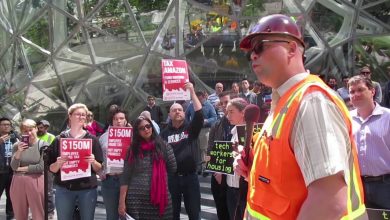50 years after Apollo 11, unsung heroes of Mission Control ponder past and future of the final frontier
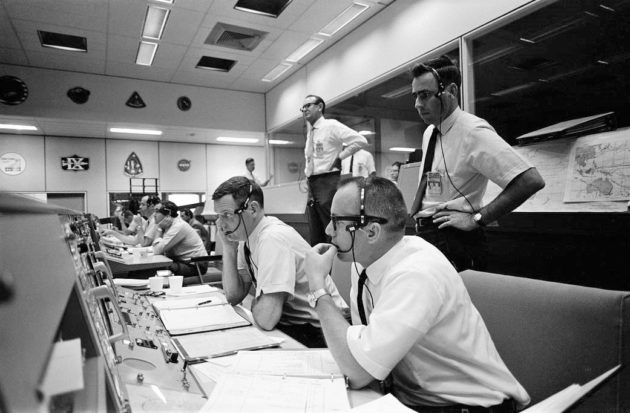
[Editor’s Note: This episode of the GeekWire Podcast is part of the Destination Moon podcrawl, organized by Seattle’s Museum of Flight. Look for other episodes about the Apollo 11 50th Anniversary in the coming days from other participating podcasts: Flight Deck from the Museum of Flight; Sound Effect from KNKX Radio; The Truth from Radiotopia; and Stuff You Missed in History Class.]
Fifty years ago, it took a special kind of person to work in NASA’s Apollo Mission Control: Take Gerry Griffin and Milt Windler, for example.
Both men got their degrees in aeronautical engineering and became jet fighter pilots — but when NASA needed flight controllers for the space race against the Soviets, they answered the call and traded their cockpits for control panels. Both were elevated to flight director roles in the wake of the Apollo 1 fire, which killed three astronauts in 1967. There was one key requirement for the job: winning the approval of Chris Kraft, director of flight operations at Mission Control in Houston.
“Chris Kraft decided he needed more flight directors to make it to Apollo, and in those days, if Chris wanted you to be a flight director, you were a flight director,” Griffin said during a recent stopover at Seattle’s Museum of Flight. “Nowadays you have to go through a certification process. …”
“We probably wouldn’t have made the cut,” Windler joked.
For the Apollo 11 mission in July 1969, Griffin headed the Gold team for Apollo 11 at NASA’s Manned Spaceflight Center, now known as Johnson Space Center. Windler was in charge of the Maroon team, which focused on mission planning. Windler recalled that he didn’t have much time to savor the triumph of humanity’s first landing on the moon.
“At the time, we were thinking about 12, or 13. … The most important mission that we’re doing is the next one,” he said.
Griffin compared the job to being a symphony conductor, with one big difference: The performance of the team could make the difference between life and death for the astronauts up above.
“The DNA of the people inside Mission Control was, they liked that challenge,” Griffin said. “They liked being decisive. You couldn’t say, ‘Well, I don’t know, it could be this.’ You had to make a decision. It’s the way we were wired.”
Windler agreed. “It doesn’t do you any good to have the answer tomorrow if you need it today,” he said.
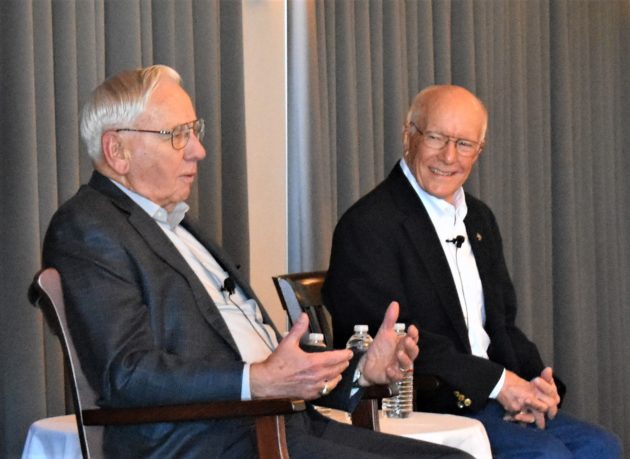
That attitude extended to the rest of the Mission Control team — including the only woman in the room when big decisions were being made.
Poppy Northcutt was trained as a mathematician and worked for TRW, a NASA contractor, as a “computress” in the early days of the space effort. She was soon promoted to an engineering post on Mission Control’s planning and analysis team.
“I think everybody that worked on the program was acutely aware that this was very much a national priority, and national prestige was on the line,” she said.
Northcutt took part in planning the trajectory for the Apollo 8 crew’s return after a round-the-moon mission in 1968, and helped calculate the maneuvers needed to save Apollo 13’s crew in 1970 after their craft was crippled by an oxygen-tank explosion. She and the rest of the Apollo Mission Operations Team won the Presidential Medal of Freedom for their role in the rescue.
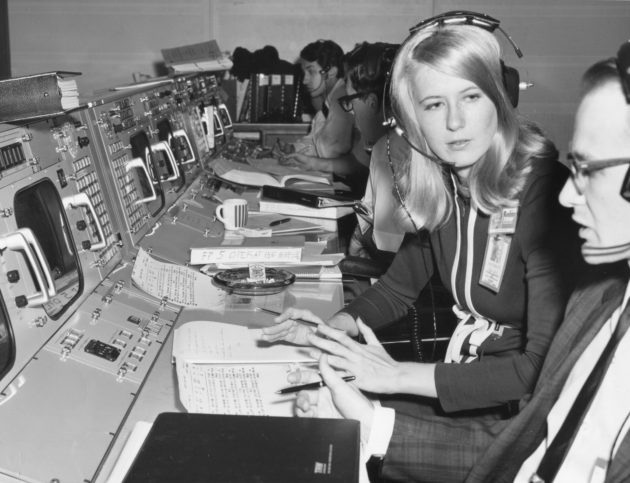
Back in the ’60s, Northcutt was in the news due to her status as the sole woman in Mission Control. (Another woman engineer, JoAnn Morgan, held a similar status in the Apollo-era firing room at Kennedy Space Center in Florida.) After Apollo, Northcutt traded in her space celebrity and became an attorney specializing in women’s rights. But now she’s back in the spotlight, showing up in TV documentaries such as National Geographic’s “Apollo: Missions to the Moon” and PBS’ “Chasing the Moon.”
Northcutt said she hopes people who see movies and TV shows about the Apollo program “will really appreciate the degree of teamwork that was involved and the degree of commitment that was involved.”
Ideally, viewers will feel “the kind of pride that not just Americans felt at the time but I think people all around the planet felt: that we had made a human achievement, not just an American achievement — and recognize that we can really do great things if we make the commitment and work as a team.”
“We can make great things,” she said. “We can solve great problems.”
Northcutt said she was surprised by Apollo’s enduring appeal.
“It’s really been sort of a shock to see how much attention this 50th anniversary is going to get,” Northcutt said. “But it was an incredibly significant event. I think it was the technical high point, certainly of the 20th century, and I don’t think it’s been surpassed to date.”
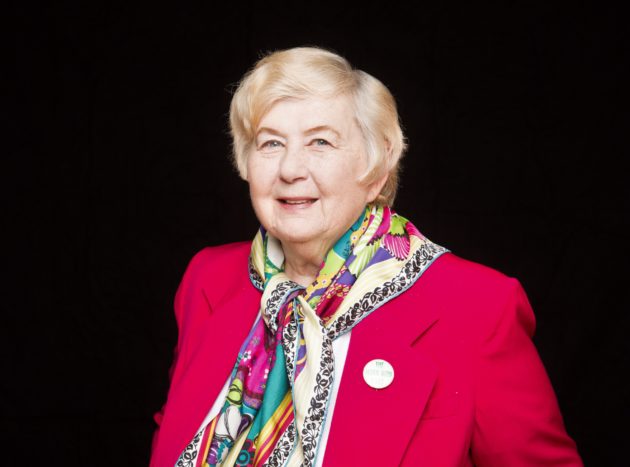
We recently spoke with Griffin, Windler and Northcutt about the past and the future of America’s space effort for a special Apollo anniversary edition of the GeekWire Podcast. Listen to the audio above, and continue reading for edited highlights from their comments.
Contents
Importance of the Apollo missions
Northcutt: “Well, it definitely wasn’t just a job. I think everybody that worked on the program was acutely aware that this was very much a national priority and national prestige was on the line and that this was a really singular event. Technologically, to be able to go to the moon, that was something that was a matter of science fiction for decades. I suspect that people going back centuries have looked up at the moon and thought about going there. So yeah, I think everybody that was associated knew that it was a really singular and important event.”
Do the movies get it right?
Windler: “People building the movies, they do a pretty good job of that. Of course they all have different aspects maybe they’re looking at, but they do a pretty good job, the ones I’ve seen. We talked a little bit about some of the things in the Apollo 13 movie, for example, and they did dramatize a little bit of it, but that’s to be expected. But the basic story was good.”
Griffin: “Not everybody gets it exactly right, but the fact that they’re talking about it is probably as important as anything, 50 years later. And it’s good that a few of us are still around to be able to straighten out some of it, if asked. But I think most of the stuff I’ve seen has been pretty good. Fifty years ago, none of us ever saw this coming, that there would be this kind of interest. I really think it must have hit a tone somewhere that this happened 50 years ago and we’d better not let it go. This is a good occasion to bring it to the forefront again.”
Diversity in the space program
Northcutt: “When people look at the rooms back then and they see basically a whole bunch of nerdy-looking white guys wearing white shirts and black ties — IBM uniforms, so to speak — that’s sort of jarring, I think, in today’s culture that there are no black people, there are no Hispanic people. It’s just jarring to people.”
Future of American space exploration
Northcutt: “I certainly hope that we will go back to the moon and go further still. Go on to Mars and do further exploration. I found it very disappointing that, back 50 years ago, right after Apollo 11, they started immediately cutting back on the program. To me, that was really wasteful and very short-sighted because to do something like going to the moon, your efforts, your technological development is very front-end-loaded. It’s sort of crazy that you spend all this money on the front end to get there and then you don’t fly out your advanced missions because we never really got into high-inclination missions, any of those really advanced missions at all.
“I had even worked on some of those, some of the early mission planning for those, even a little bit of Mars work. It was very disappointing to me that we did not continue on at the time, so I’m pleased that people are talking about going back. I’m not celebrating quite yet though because if you’re going to do something like this, you have to put the money out to do it and you have to have real commitment to do it, focus and commitment, and I don’t see the money, so until I see the money, I don’t think people are serious.”
Windler: “I would have guessed that we would be a lot further along than we are now. … If you’ve got the resources and the will and all these other things come together you can make it happen. That’s what happened in Apollo 11. But you have to have all of those. And right now I don’t see that actually happening, but maybe it’ll be better.”
Griffin: “I think the moon is the right place to go first. It’s been 50 years since we’ve been that far. And it’s different than operating in Earth orbit, it’s totally different, and it has a different feel to it. The communication is just not as simple. So I really hope we go to the moon first, and that’s the current plan, and then on to Mars. And those two are still baby steps. I think one day we got to go farther than that because we’re going to use this planet up. It may be 1,000 years from now, it may be 10,000, who knows. But we better learn how to travel at space and if the species is going to survive, I think we may have to move off this one.”
Advice for future mission leaders
Griffin: “Stay prepared and have fun with it. It is a fascinating business. When you get to a point like a flight director or somebody in charge of an operation, you’ve got a tremendous responsibility on your hands for one thing, in particular, when you put humans on board, it’s slightly different than when you’re launching a robot to Mars or something. But the basic skills are the same. You’ve got to think a little differently. And I think robotic spacecraft has a purpose, and a good purpose, and could be precursors to everything else we do. But ultimately, it’s in our own DNA that we’re going to explore. … We can’t get rid of that. I think it’s with us, it’s why we opened up the American West and didn’t stop at the East Coast, pushed the frontier. So this is pushing the frontier to a new level.”
Podcast editing and production by Todd Bishop.
Conclusion: So above is the 50 years after Apollo 11, unsung heroes of Mission Control ponder past and future of the final frontier article. Hopefully with this article you can help you in life, always follow and read our good articles on the website: Ngoinhanho101.com


